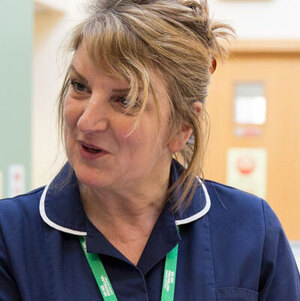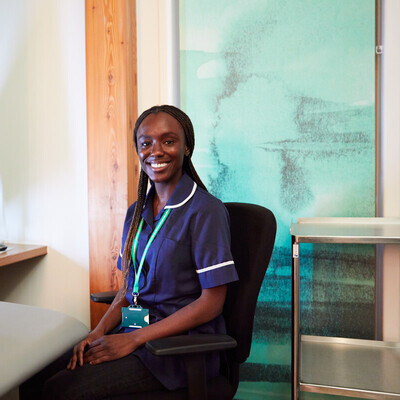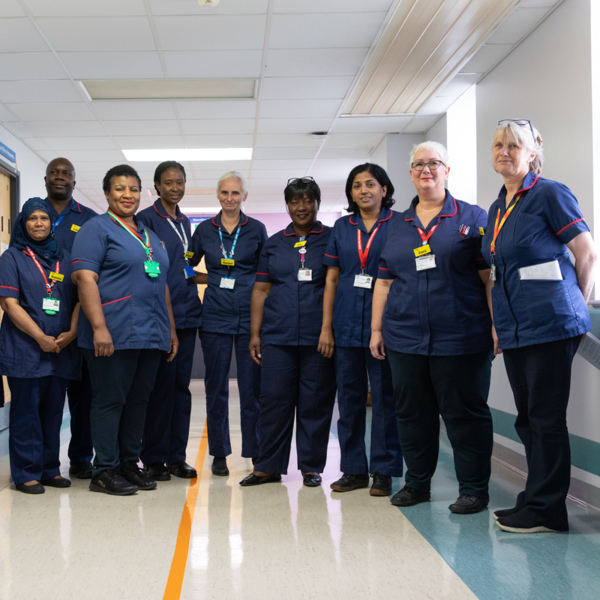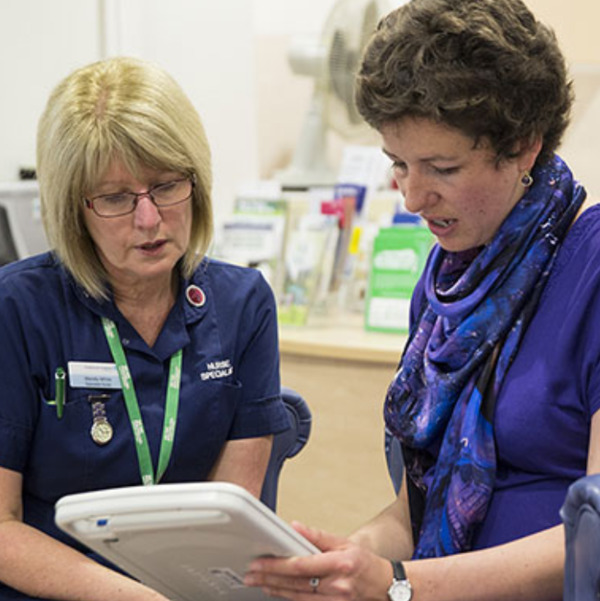
Nurses working in cancer care
Types of nurses working in cancer
Cancer nurses are often the first point of contact with patients during treatment. They can help you understand your cancer diagnosis and treatment whilst offering support to you, and the people close to you.
Nurses work in hospitals, hospices and in the community. They communicate with different care providers and healthcare professionals to coordinate and deliver patient care plans.
Find out more about the different types of nurses working in cancer care below:
-
General practice nurse
General practice nurses work in GP surgeries, assessing and treating patients. They provide nursing care including:
- management of long-term conditions
- screening services
- immunisation services
- health promotion services
- Well women/well man services
- delivery of Department of Health initiatives e.g., Chronic Disease Management Programme.
General practice nurses may also work at an advanced nursing level.
-
Systemic Anti-Cancer Therapy (SACT) nurse
Systemic Anti-Cancer Therapy (SACT) nurses are registered nurses who have undertaken additional training in SACT. They work within SACT units, oncology/haematology wards and in the community.
SACT nurses provide care to cancer patients by:
- educating patients on their treatments, and ensuring they know who to contact if they feel unwell
- assessing patients pre-treatment, and discussing any concerns patients may have, whether this be physical, emotional, spiritual and/or social
safely administering SACT to the patient - sharing knowledge of side effects and symptoms of specific SACT drugs.
Some SACT nurses work at an advanced level. They provide reviews pre-treatment to then prescribe systemic anti-cancer therapy. They will assess the patient if they become unwell, make changes to the treatment, or stop treatment if felt not to be in the patient’s best interest.
-
Consultant nurse
A nurse consultant is a registered nurse, who will have years of experience as a cancer nurse. They will hold a PhD or be working towards one at an advanced level of practice.
Nurse consultants often specialise in a particular clinical specialty in cancer. Within this role, they will demonstrate competency and experience within these four pillars of advanced clinical practice: learning, leadership, research and development.
Nurses working at this level lead and influence service and policy development at strategic level while continuing to provide a strong clinical commitment and expert advice to clinical colleagues. They usually work within multidisciplinary teams across organisational, and professional boundaries.
-
Lead cancer nurse
Lead cancer nurses are registered general nurses, usually with a Master's degree. They work in hospital trusts in secondary care and play a critical role in leading the national cancer agenda. They support the strategic direction of cancer for cancer nurses and Allied Health Professionals, within their Trust.
Cancer nurses ensure patients receive fair and consistent cancer care. They work alongside divisional teams, cancer nurse specialist teams, and their wider multidisciplinary cancer team. Their work influences the ongoing development of cancer care.
The lead cancer nurse works with the lead cancer clinician and cancer manager. They contribute to the planning and delivery of cancer services at a local level. This will be in line with government guidance.
They provide senior leadership for cancer nursing. They do this by working with other departments and roles, including:
- Clinical Service Unit representatives
- Deputy and Director of Nursing
- Heads of nursing for other specialties
- Personalised Care Lead
- Allied Health Professionals.
-
Clinical nurse specialist
The cancer nurse specialist is a registered nurse educated to graduate level, and often Master’s level. They are clinical experts with advanced clinical skills. They work in a specialty area or cancer type, often as a part of a multidisciplinary team.
Cancer nurse specialists use their knowledge of cancer and its treatments to support patients with their problems and concerns. They coordinate services, personalise care, and provide support to patients and their families.
They are a key role in the cancer multidisciplinary team, using case management, empathy and knowledge to support patients. They also help reduce their risks and ensure a high quality experience.
They use knowledge and insights from patient experience to lead and improve cancer patient services.
-
Palliative care nurse
Palliative care and end of life care are provided by nurses working in different settings such as hospital and in people’s homes. This is often only part of their work as they provide generalist services unless they are working in a specific service such as a hospice or Marie Curie Nursing service. They provide active holistic care and help to control symptoms and provide end-of-life care to patients and support to family and significant others.
Alongside these nurses there are also Specialist Palliative Care Nurses who are registered nurses educated to graduate level, and often master’s level. They work as part of the multi-disciplinary team and are clinical experts with advanced clinical skills. Specialist Palliative Care Nurses provide support to those who have more complex needs. This includes emotional support and symptom management, as well as supporting decisions around treatments.
-
Acute oncology service (AOS) nurse
Acute oncology nurses are registered nurses, who focus on patients who have an acute illness as a result of their cancer, cancer treatment, or are newly diagnosed within the acute setting.
Acute Oncology Services (AOS) can vary between different hospitals and the scope of this role can be quite wide. However, the main roles of the Acute Oncology Nurse are usually:
- To ensure cancer patients have a timely specialist review, with the aim to improve safety and effectiveness of emergency cancer care.
- Provide education to staff on oncology emergencies
- Ensure there are evidenced based protocols and pathways for oncology emergencies, which all staff can access
- Coordinate the 24 hour triage line for patients, and in the majority of centres, in hours, manage the line and take the patient calls.
Some AOS nurses work at an advanced level, and with specialist knowledge and experience, work autonomously to review, plan and implement the care of acutely unwell patients.
How to become a Macmillan nurse
Most Macmillan Professional roles are not directly recruited by us. Instead, they are advertised and recruited through our partner organisations. We encourage those interested in working as a Macmillan Professional to apply for these roles. However, these roles may not always be available.
Whether you are in a Macmillan Professional role or another cancer role, you'll be making a difference in the lives of people with cancer.
Information and support from other organisations
Sarah, Clinical Nurse Specialist
Stories from nurses

Andrew, Palliative Care Clinical Nurse Specialist






